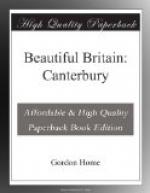Before the knights began the recital of their complaints, however, Becket appears to have become alarmed at the demeanour of the four men, who afterwards admitted that they thought of killing him then and there with the only weapon that was handy—a cross-staff that lay at his feet.
The monks hurried back, and Fitzurse, apparently calmed by their presence, resumed his statement of the complaints of the King. The complaints—which are given by the various chroniclers in very different words—were three in number. “The King over the water commands you to perform your duty to the King on this side of the water, instead of taking away his crown.” “Rather than take away his crown,” replied Becket, “I would give him three or four crowns.” “You have excited disturbances in the kingdom, and the King requires you to answer for them at his court.” “Never,” said the Archbishop, “shall the sea again come between me and my Church, unless I am dragged thence by the feet.” “You have excommunicated the bishops, and you must absolve them.” “It was not I,” replied Becket, “but the Pope, and you must go to him for absolution.”
[Illustration: The chapel of “Our
Lady” In the undercroft of
the
cathedral.
Being entirely above the ground this is not a crypt
as it is so often miscalled. The morning light
in winter fills the spaces between the massive Norman
piers.]
After some more stormy words the knights became irritated by Becket’s contradictions, and swore “by God’s wounds” that they had endured enough, but Becket, putting aside John of Salisbury’s suggestion that he should speak privately to the angry knights, began to complain of the grievances and insults he had himself received during the preceding week: “They have attacked my servants,” he said; “they have cut off my sumpter-mule’s tail; they have carried off the casks of wine that were the King’s own gift.” To this Hugh de Moreville, who was the least aggressive of the four, replied: “Why did you not complain to the King of these outrages? Why did you take upon yourself to punish them by your own authority?” But Becket, turning sharply towards him, said: “Hugh! how proudly you lift up your head! When the rights of the Church are violated, I shall wait for no man’s permission to avenge them. I will give to the King the things that are the King’s, but to God the things that are God’s. It is my business, and I alone will see to it.” Taking up such an attitude in front of four men who had come hot-foot to Canterbury with the express determination to seek an excuse for killing him, Becket was sealing his own fate.




